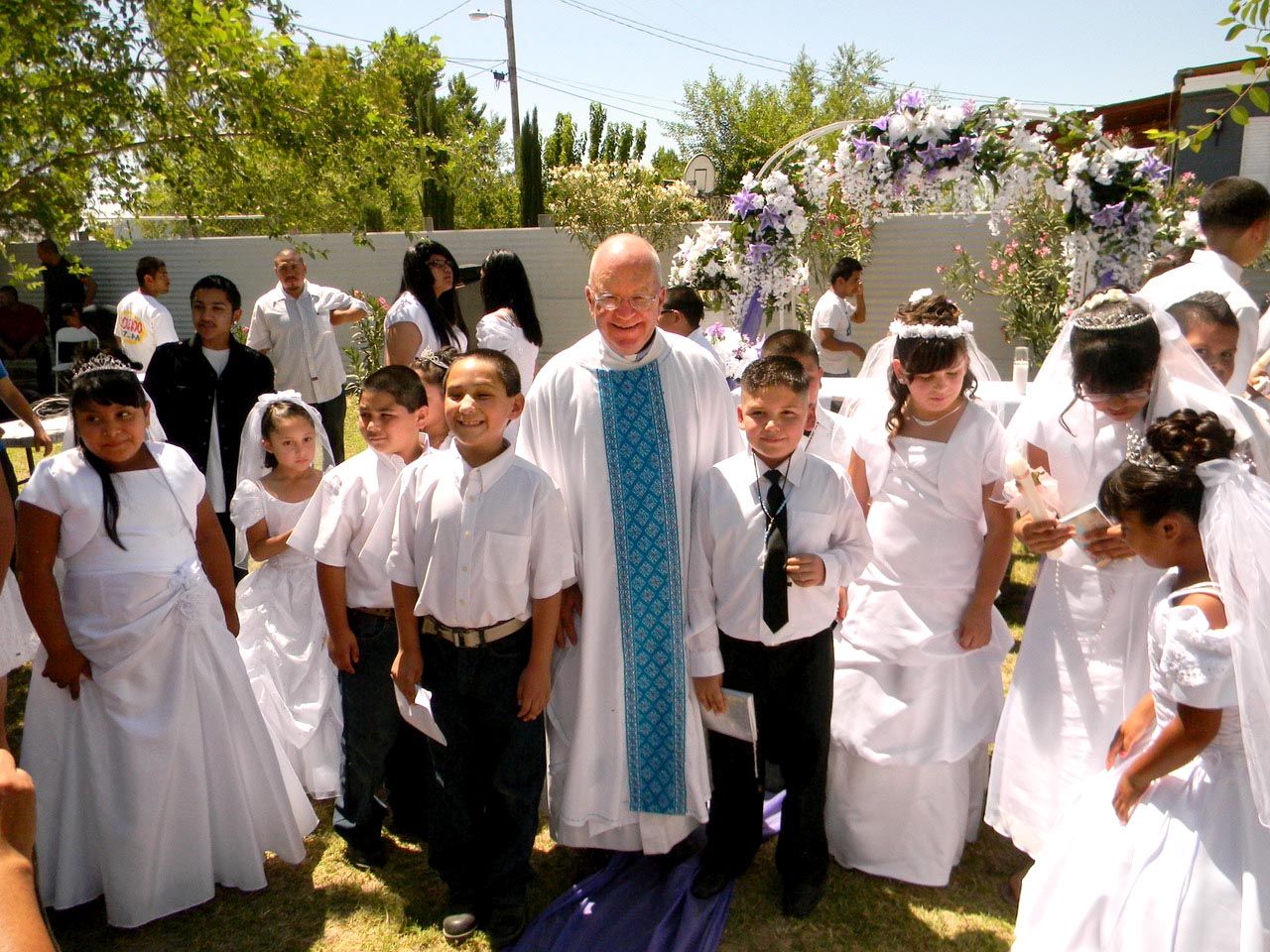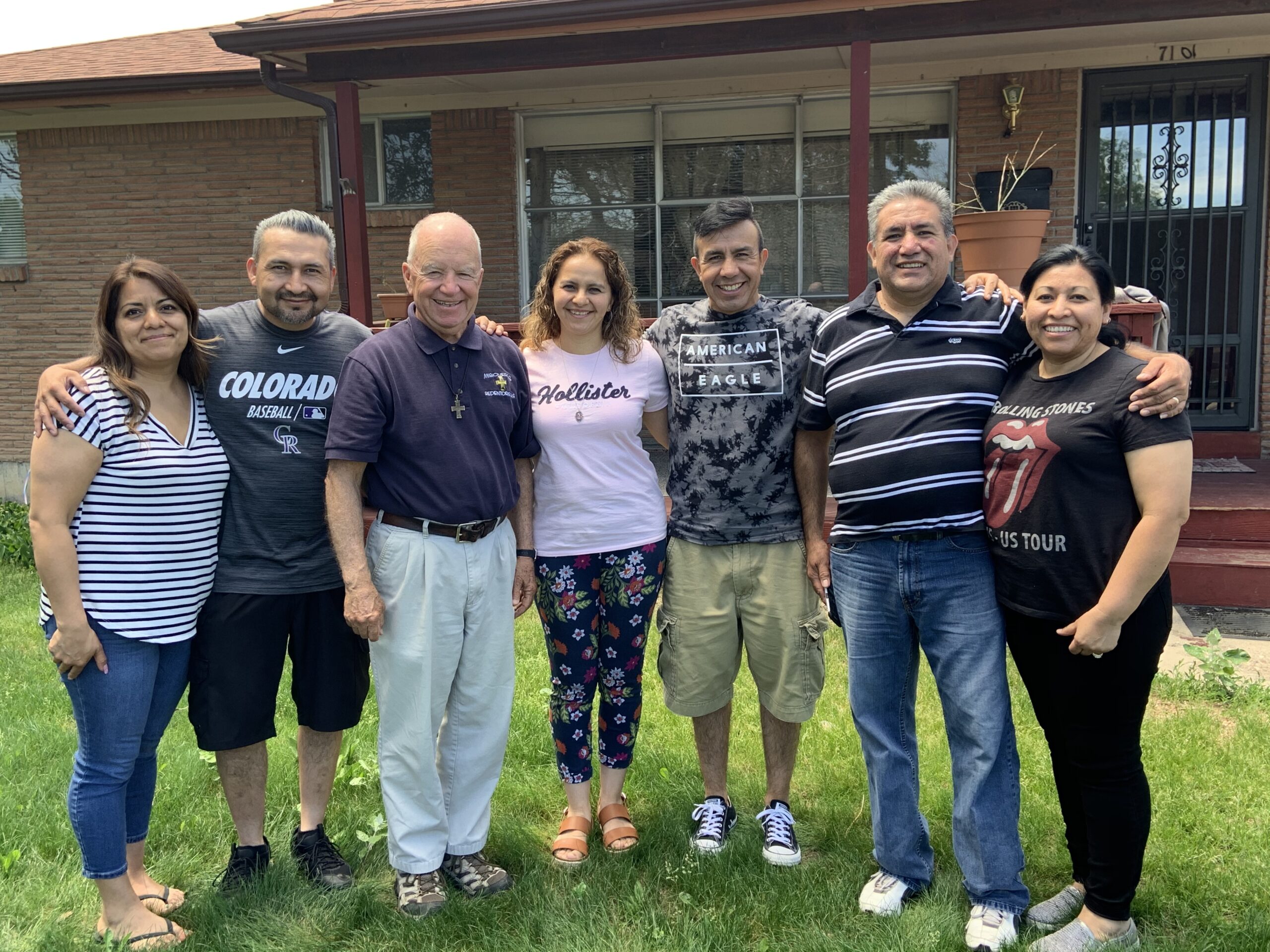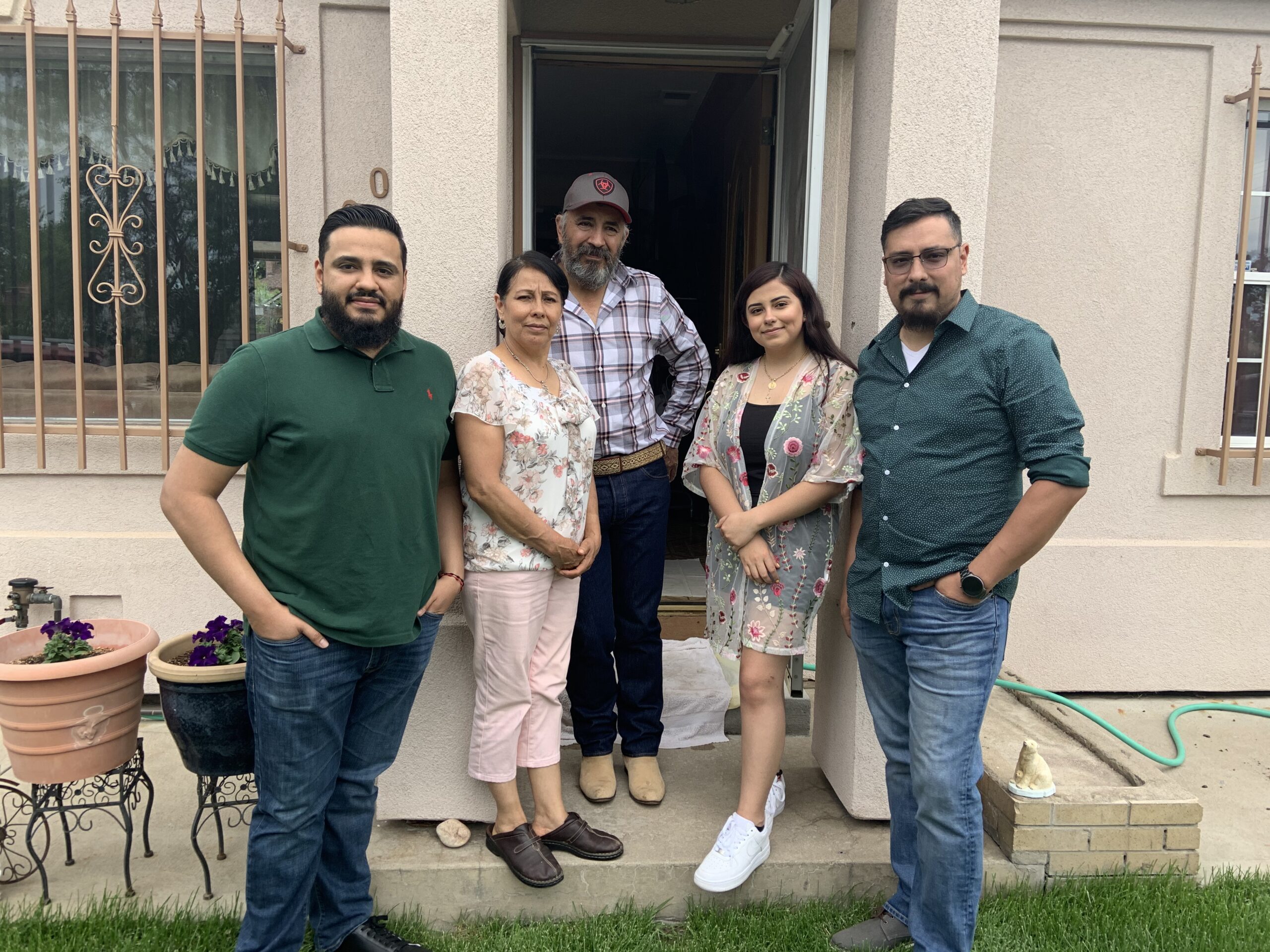Eucharist today: Parents teaching children / Padres enseñando a sus hijos
“Involving parents in teaching their children.”
“Parents must be acknowledged as the first and foremost educators of their children.” (Declaration on Christian Education, p. 3 Second Vatican Council)
“You have asked to have your child baptized. In doing so you are accepting the responsibility of training him (her) in the practice of the faith. It will be your duty to bring him (her) up to keep God’s commandments as Christ taught us, by loving God and our neighbor. Do you clearly understand what you are undertaking?” (from the Rite of Baptism)
The catechist responds to the call of Jesus to the apostles, “Go, make disciples of all nations.” (Mt. 28: 29) It is a call to evangelize. The formation and education of catechists is a serious responsibility of parishes and dioceses. In recent years, on account of misconduct of some people in ministry, more attention is paid to moral character and conduct of the prospective catechist. At times, it is difficult to find people suitable or available to fill the ministry of catechist. What is a parish to do?
In recent years, in many places, it is difficult to find volunteers qualified and available to prepare children for the sacraments of the Church. In these situations, I have considered the meaning of the two quotations above. If parents are the first and foremost educators of their children, how can we assist them in that critical responsibility. When training catechists, I ask the question, “As a catechist, what is your responsibility?” Many respond, to “teach children about their faith.” I say, “No, your responsibility is to help parents fulfil the responsibility they assumed at their child’s baptism.”
When a family asks for sacraments for their children, it is important that our response be given in a timely manner. It is important to know the faith of the parents and their participation in the life of the church. I had a great lesson in the need for timeliness in the story that I told on Sept. 9, “The First Communion of Seven Children of Migrants.” (http://padremigrante.org/migrant-stories-historias-de-migrantes/) That summer, a group of seminarians and lay catechists offered a two-week summer school to prepare for First Communion. The first evening of the class, a religious sister and I invited the parents to a class for the parents. At the close of the class, Sister and I told the parents that each evening we would have a class for the parents. We told them that the class was not obligatory. Their children will all receive the Eucharist. We were surprised to have one or both parents of every child present each evening. The lesson for us was that people responded to the invitation when we emphasized that it was not an obligation.
Another experience, we simply had no volunteer catechists while having about thirty children seeking First Communion. I announced that on a certain Sunday, people could register their children for the sacrament and that there would be a class for parents and children. I gave each parent and child a bilingual booklet of basics on the sacraments. I instructed the parents to read the materials with their children and to say certain basic prayers each day together as a family for one month. The next month there was a second class after the Sunday Mass. There were four classes for parents and children, and the family had homework that included catechesis, scripture and prayer. The parents took their role seriously and the children were quite confident as they approached for the sacraments. Several months later, a mariachi group played for the Mass for Our Lady of Guadalupe and one member told me after Mass, “I have played for Masses for 25 years and I never have seen children so reverent in receiving the Eucharist.” These children were taught by their parents.
Two days ago, I told the story of a family asking for Baptism for three children ages twelve, ten and seven. The parents were not very active in their faith. I told them to respond in a timely manner to respond to their request to baptize their children, I told them I would baptize the children in the parents taught the children. They did not know how they could do that. I told them that I would give them a half hour class after Mass twice a month and they would teach their children in the home. Ten weeks later the children were baptized, confirmed and receive first Eucharist. A short time late the wife joined a women’s group in the parish and the husband joined a group of men who volunteered to do maintenance for the parish.
We need to empower parents to fulfill the promises that they make at the baptism of their children.
(Tomorrow: Mystagogia and catechesis)
“Involucrar a los padres en la enseñanza de sus hijos”.
“Los padres deben ser reconocidos como los primeros y principales educadores de sus hijos”. (Declaración sobre la educación cristiana, p. 3 Concilio Vaticano II)
“Usted ha pedido que su hijo sea bautizado. Al hacerlo, está aceptando la responsabilidad de educarlo/la en la práctica de la fe. Será su deber educarlo/la para que guarde los mandamientos de Dios como Cristo nos enseñó, amando a Dios y a nuestro prójimo. ¿Entiendes claramente lo que estás comprometiendo?” (del Rito del Bautismo)
El catequista responde a la llamada de Jesús a los apóstoles: “Hagan discípulos a todas las naciones”. (Mt.28: 29) Es un llamado a evangelizar. La formación y educación de los catequistas es una responsabilidad seria de parroquias y diócesis. En los últimos años, debido a la mala conducta de algunas personas en el ministerio, se presta más atención al carácter moral y la conducta del futuro catequista. A veces, es difícil encontrar personas adecuadas o disponibles para desempeñar el ministerio de catequista. ¿Qué debe hacer una parroquia?
En los últimos años, en muchos lugares, es difícil encontrar voluntarios calificados y disponibles para preparar a los niños para los sacramentos de la Iglesia. En estas situaciones, he considerado el significado de las dos citas anteriores. Si los padres son los primeros y más importantes educadores de sus hijos, ¿cómo podemos ayudarlos en esa responsabilidad? Cuando capacito a los catequistas, hago la pregunta: “Como catequista, ¿cuál es su responsabilidad?” Muchos responden, “enseñar a los niños sobre la fe”. Yo digo: “No, su responsabilidad es ayudar a los padres a cumplir con la responsabilidad que asumieron en el bautismo de sus hijos”.
Cuando una familia pide sacramentos para sus hijos, es importante que respondamos de manera oportuna. Es importante conocer la fe de los padres y su participación en la vida de la iglesia. Recibí una gran lección sobre la necesidad de ser puntual en la historia que conté el 9 de septiembre, “La primera comunión de siete hijos de migrantes”. (http://padremigrante.org/migrant-stories-historias-de-migrantes/) Ese verano, un grupo de seminaristas y catequistas laicos ofrecieron una escuela de verano de dos semanas para preparar niños para la Primera Comunión. La primera noche de la clase, una hermana religiosa y yo invitamos a los padres a una clase. Al final de la clase, la hermana y yo les dijimos que cada noche tendríamos una clase para los padres. Les dijimos que la clase no era obligatoria. Todos sus hijos recibirán la Eucaristía. Nos sorprendió tener a uno o ambos padres de cada niño presentes cada noche. La lección para nosotros fue que la gente respondió a la invitación cuando enfatizamos que no era una obligación.
Otra experiencia, simplemente, no tuvimos catequistas voluntarios mientras teníamos una treintena de niños que buscaban la Primera Comunión. Anuncié que cierto domingo la gente podría inscribir a sus hijos para la Santa Cena y que habría una clase para padres e hijos. Le di a cada padre e hijo un folleto bilingüe de conceptos básicos sobre los sacramentos. Les pedí a los padres que leyeran los materiales con sus hijos y que dijeran ciertas oraciones básicas todos los días como familia durante un mes. El mes siguiente hubo una segunda clase después de la misa dominical. Hubo cuatro clases para padres e hijos, y la familia tenía deberes que incluían catequesis, escritura y oración. Los padres se tomaron en serio su papel y los niños se sintieron muy confiados al acercarse a los sacramentos. Varios meses después, un grupo de mariachis tocó en la Misa de Nuestra Señora de Guadalupe y un miembro me dijo después de la Misa: “He tocado en las Misas durante 25 años y nunca he visto niños tan reverentes al recibir la Eucaristía”. Estos niños fueron enseñados por sus padres.
Hace dos días, conté la historia de una familia que pidió el bautismo de niños de doce, diez y siete años. Los padres no fueron muy activos en su fe. Les dije que respondieran de manera oportuna para responder a su solicitud de bautizar a sus hijos, les dije que bautizaría a los niños en las enseñanzas de los padres a los niños. No sabían cómo podían hacer eso. Les dije que les daría una clase de media hora después de la misa dos veces al mes y que enseñarían a sus hijos en casa. Diez semanas después, los niños fueron bautizados, confirmados y recibieron la primera Eucaristía. Poco tiempo después, la esposa se unió a un grupo de mujeres en la parroquia y el esposo se unió a un grupo de hombres que hicieron mantenimiento de la parroquia.
Necesitamos capacitar a los padres para que cumplan las promesas que hacen en el bautismo de sus hijos.
(Mañana: Mystagogia y catequesis)
Here are ten themes to be covered considering participation in the Eucharist today:
- Role of the Eucharist in my own personal vocation story
- Benefits of celebration of Eucharist where migrants gather
- Exposure of obstacles to reception of First Eucharis that migrants experience
- Bishop John Steinbock’s reflection at Fresno Convocation of Clergy, 2010
- “You only have the time that God gives you”
- Responsibility of the priest to make the word and the sacramental presence of Christ present for the People of God
- Remember that the sacraments of Baptism, Confirmation and Eucharist are sacraments of initiation
- Involve the parents in the sacramental preparation of children
- The place of Mystagogia, continuing education and spiritual development
- Quality migrant ministry can inspire the ordinary ministry of our communities
Aquí hay diez temas considerando participación en la eucaristía hoy:
- Papel de la Eucaristía en mi propia historia vocacional personal
- Beneficios de la celebración de la Eucaristía donde se reúnen los migrantes
- Exposición de obstáculos a la recepción de la Primera Comunión que experimentan los migrantes
- Reflexión del obispo John Steinbock en Fresno Convocación de los Cleros, 2010
- “Solo tienes el tiempo que Dios te da”
- Responsabilidad del sacerdote de hacer presente la palabra y la presencia sacramental de Cristo para el Pueblo de Dios
- Recuerde que los sacramentos del Bautismo, la Confirmación y la Eucaristía son sacramentos de iniciación.
- Involucrar a los padres en la preparación sacramental de los niños.
- El lugar de mystagogia, educación continua y desarrollo espiritual
- Un ministerio migrante de calidad puede inspirar el ministerio ordinario de nuestras comunidades.





